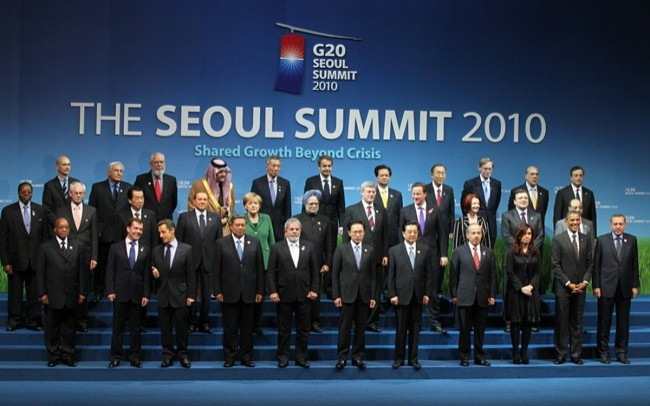G20 Comes Up Short On Action, But Leaders Hope For More

Leaders at the G20 spent as much time promoting the process itself as the real accomplishments of the summit. Most said that while there was little in the way of concrete rules, there were a number of steps in the right direction.
French President Nicholas Sarkozy pointed to the fact that China has agreed to host a meeting on developing criteria for monetary reform next spring, while Brazilian Finance Minister Guido Mantega had to field questions about whether the G20 would keep any credibility if member states - especially the United States and China - decide to simply ignore the G20 recommendations.
President Barack Obama said it would be wrong to expect results instantly, and that coordinating between countries takes time.
On currency reform, the summit didn't result in another Bretton Woods-like agreement. But Mantega noted that there were steps, such as China pegging the yuan to a basket of currencies, that show progress towards an alternative to the dollar as a reserve currency.
Yes, it is complicated. Yes, it is difficult, said Sarkozy, who assumes the presidency of the G-20 for 2011, as the summit will be held next year in Cannes. But the legitimacy of the debate is no longer in dispute. We must improve our world's monetary order.
Angel Gurria, secretary-general of the Organization for Economic Cooperation and Development, an NGO that participated in the summit and is consulted by most of the G-20 nations, said the challenge is to prove the G20 is as good in building a new, sustainable growth path as it was in managing the crisis. Our credibility and our very raison d'etre is at stake.
Having exhausted most of the room for expansionary macroeconomic policies, we now need a clear and ambitious agenda for structural reform.
The G-20 communiqué is an ambitious agenda and does aim at structural reform. The question is whether the world's most powerful nations will adhere to the reforms when they are ready to be enacted.
We will implement a range of structural reforms to boost and sustain global demand, foster job creation, contribute to global rebalancing, and increase our growth potential, the communiqué reads.
It goes on to name a wish list of product market reforms, tax reforms, labor market reforms, green growth initiatives, social safety net reforms and infrastructure investments and further financial regulatory reforms.
But, as Sarkozy said, We cannot tell China and the United States what to do.
It remains to be seen if the world's two biggest economies will actually do the necessary work, and make the necessary sacrifices, to achieve a more equitable, harmonious global system - the capitalism with a conscience, that Sarkozy and other leaders seek.
Advocates for the more disadvantaged people of the world were both critical and cautiously optimistic about the communiqué.
G20 leaders are finally acknowledging that the one-size-fits-all Washington Consensus, which has dominated development discourse for three decades, does not work, says Michael Switow of the Global Call to Action Against Poverty, or GCAP. With the world still reeling from the financial crisis, which has hit women and marginalised communities the hardest, we're glad to see that the G20 is addressing poverty issues, but the new focus on investment and infrastructure must not be used as an excuse to cut back on existing aid commitments.
Currency markets did not move much during the week of the G20, showing that the market did not expect any major changes; the largest change between Nov. 8 and the close of New York trading on Nov. 11 was the euro against the dollar, which fell 1.99% to $1.36 from $1.39.
The next largest shift was against the Japnese yen, at 1.12%, with the dollar rising to 82.06 from 81.15. Moves versus the British pound were the smallest, at 0.8%, to 62.4 pence from 61.9 pence.
One of the largest relative drops against the dollar was the Korean won, which fell the furthest it had in months. But that was a reaction to the possibility of capital controls rather than the G20 itself.
© Copyright IBTimes 2025. All rights reserved.





















